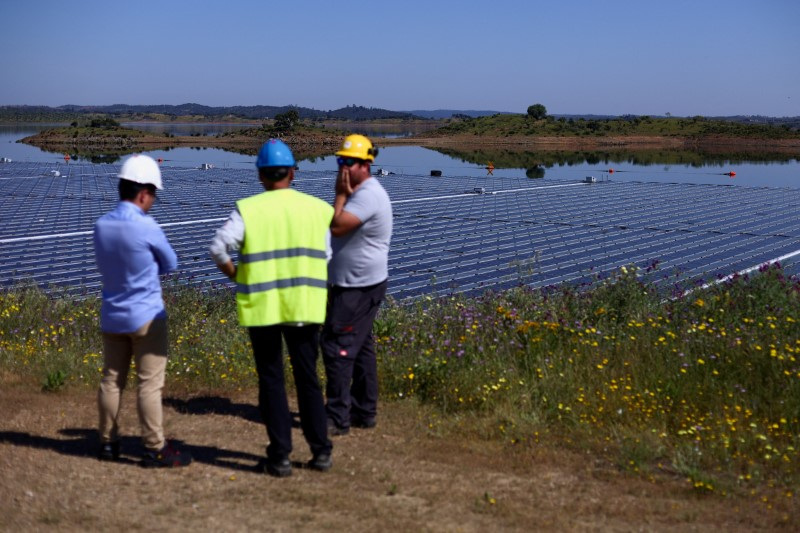By Gavin Maguire
LITTLETON, Colorado (Reuters) -Utilities in Portugal have cut the proportion of electricity production from fossil fuels to just 10% so far in 2024, leap-frogging neighbour Spain to emerge as western Europe’s second-cleanest large power sector behind France.
Total clean electricity generation through the first seven months of 2024 jumped 32% from the same months in 2023 to a record 21.76 terawatt hours (TWh), data from energy think tank Ember shows.
Record output from solar and wind farms plus the highest hydro generation total since 2016 have been the main drivers of the clean power surge, which allowed generators to slash natural gas-fired output by 60% from the January to July period in 2023.
Portugal’s power firms have also lifted total electricity generation by 7% to the highest since 2021, demonstrating that a multi-pronged approach to boosting clean generation can trigger rapid progress against energy transition targets.
TURNAROUND
The deployment of some of Europe’s largest new hydro dams and solar parks this year has been instrumental in accelerating the cuts to fossil fuel use in Portugal’s generation mix.
Both the 1,158 megawatt (MW) capacity Tamega dam and the 202 MW capacity Cerca solar farm commenced operations this year, which allowed power firms to cut total fossil fuel-generated electricity to just 2.53 TWh so far this year through July.
That fossil-fired total is down 59% from the same period in 2023, and is the lowest on record.
Total power sector emissions have dropped sharply as a result, to 2.12 million metric tons of carbon dioxide for the first seven months, which is 45% less than the same months in 2023 and a new record.
HYDRO HELP
Both the new Tamega facility plus higher precipitation levels have helped steer Portugal’s hydro generation higher this year.
Through the first seven months of 2024, pumped storage output was up 67% to 172,758 megawatt hours (MWh), while run-of-river generation was 70% higher at 259,415 MWh, according to LSEG.
Reservoir-based hydro generation was 76% up at 117,024 MWh.
All told, the cumulative gains in Portugal’s hydro generation allowed hydropower’s share of the electricity generation mix to average 35.3% so far this year, compared to 20.7% during the same period in 2023, Ember’s data shows.
Solar and wind assets have also seen their shares of the utility generation mix climb.
Solar power generated an average share of 13.3% of Portugal’s electricity so far this year, up from 10.6% in 2023, while wind farms accounted for an average share of 33.1%, up from 32.6% in January-July 2023.
And clean power’s share of the generation mix looks set to keep growing, following new proposals by Portugal’s government to increase the weight of renewables in power production.
As part of goals to become carbon neutral by 2045, renewables will generate 51% of the country’s final energyneeds by 2030, the government said last month.
Innovative deployments of renewable assets on existing energy projects look set to help achieve those goals.
The award-winning Alqueva floating solar park integrates hydro power, floating solar and battery storage that can generate 7.5 gigawatt hours (GWh) of clean energy annually.
And a planned 274 MW capacity wind farm incorporated into the Tamega dam project will generate enough clean power to meet the annual energy needs of 128,000 homes, according to developer Iberdrola (OTC:).
Further expansions in Portugal’s solar capacity is also expected following a planned project with The Nature Conservancy to identify optimal solar farm sites, and the country is also exploring offshore wind site suitability alongside upgrades at existing onshore farms.

In combination, this mix of current momentum and planned growth looks set to push Portugal even higher up the list of Europe’s clean power champions, and help the country establish itself as a global energy transition leader.

